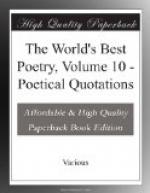Let us turn to the dictionary, and see how the matter looks to the cold-minded definer. Webster gives Poetry as “the art of apprehending and interpreting ideas by the faculty of the imagination; the art of idealizing in thought and in expression;” and then, specifically, “imaginative language or composition, whether expressed rhythmically or in prose.” This seems to come nearer the mark; although, by admitting poetical prose, the popular idea of poetry is expanded to include all writing that is infused with the imaginative quality. Thus is found place for Walt Whitman, who defies all metre, and who yet lays strong hold upon the reader—despite his whimsicalities—by the very multiplicity and suggestiveness of his imaginings among real things.
Perhaps as satisfactory a presentation of the matter as can be found is in a casual phrase of Stedman’s in the Introduction to his “American Anthology.” This true poet and master-critic, in pursuit of another idea, alludes to poetry as “being a rhythmical expression of emotion and ideality.” Here at last we have form, spirit, and theme combined in one terse utterance. In poetry we look for the musical metre, the recurrent refrain of rhythm; while that which inspires it arises from the universal motives which Coleridge names as ministers to Love,—
“All thoughts, all passions, all
delights,
Whatever stirs this mortal frame.”
With this view, then, of the vast range of poetical thinking and feeling—such as most arouse interest in all possible moods of the reader, and recalling the fact that the aim of the poet is to set forth his strains in musical measures that allure the attention and satisfy the sense of perfect expression, it will be of interest to note a few passages concerning this art of all arts from notable thinkers.
In his introduction to Ward’s admirable selections from “The English Poets,” Matthew Arnold—critic and poet—to whom allusion has already been made, says:
“The future of poetry is immense, because in poetry, where it is worthy of its high destinies, our race, as time goes on, will find an ever surer and surer stay....
“We are here invited to trace the stream of English poetry. But whether we set ourselves, as here, to follow only one of the several streams that make the mighty river of poetry, or whether we seek to know them all, our governing thought should be the same. We should conceive of poetry worthily, and more highly than it has been the custom to conceive of it. We should conceive of it as capable of higher uses, and called to higher destinies, than those which in general men have assigned to it hitherto. More and more mankind will discover that we have to turn to poetry to interpret life for us, to console us, to sustain us....
“But if we conceive thus highly of poetry, we must also set our standard for poetry high, since poetry, to be capable of fulfilling such high destinies, must be poetry of a high order of excellence.




